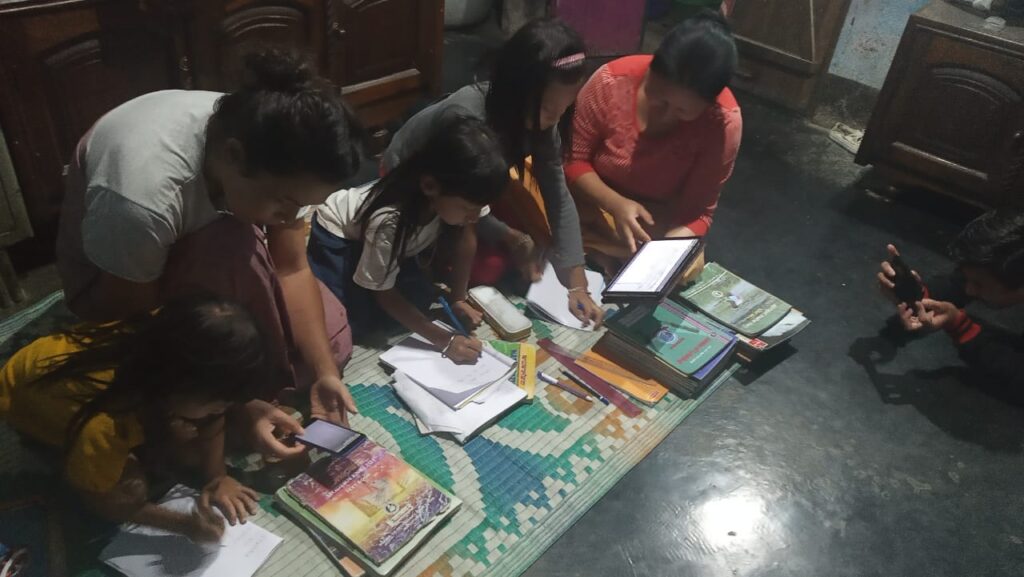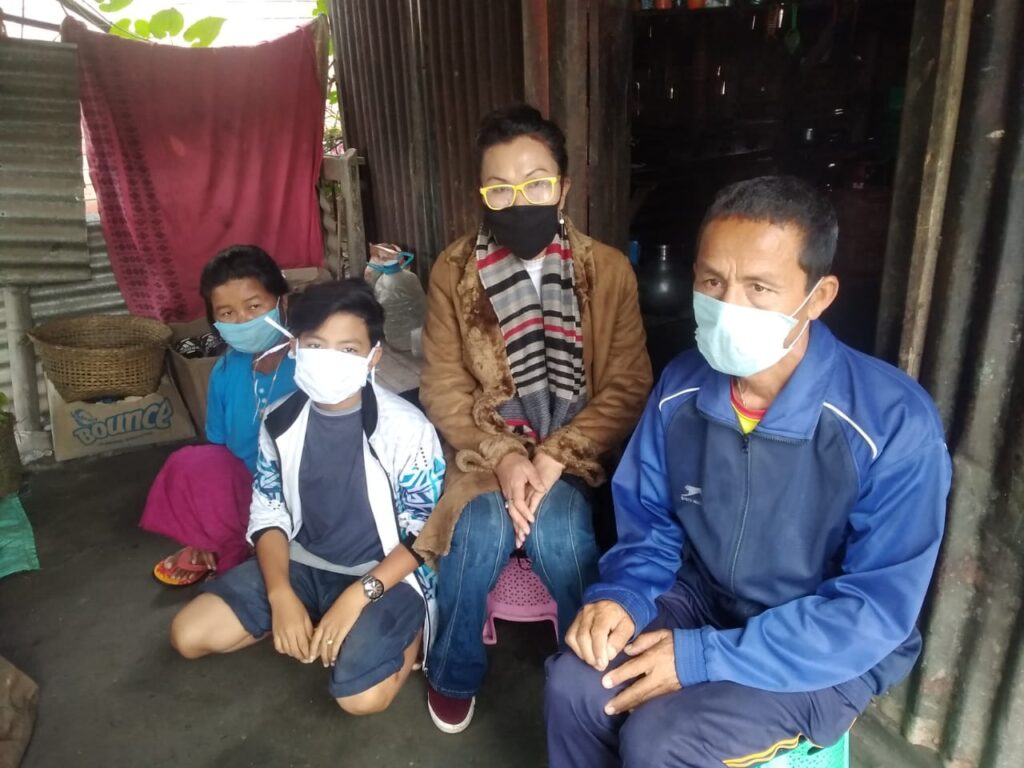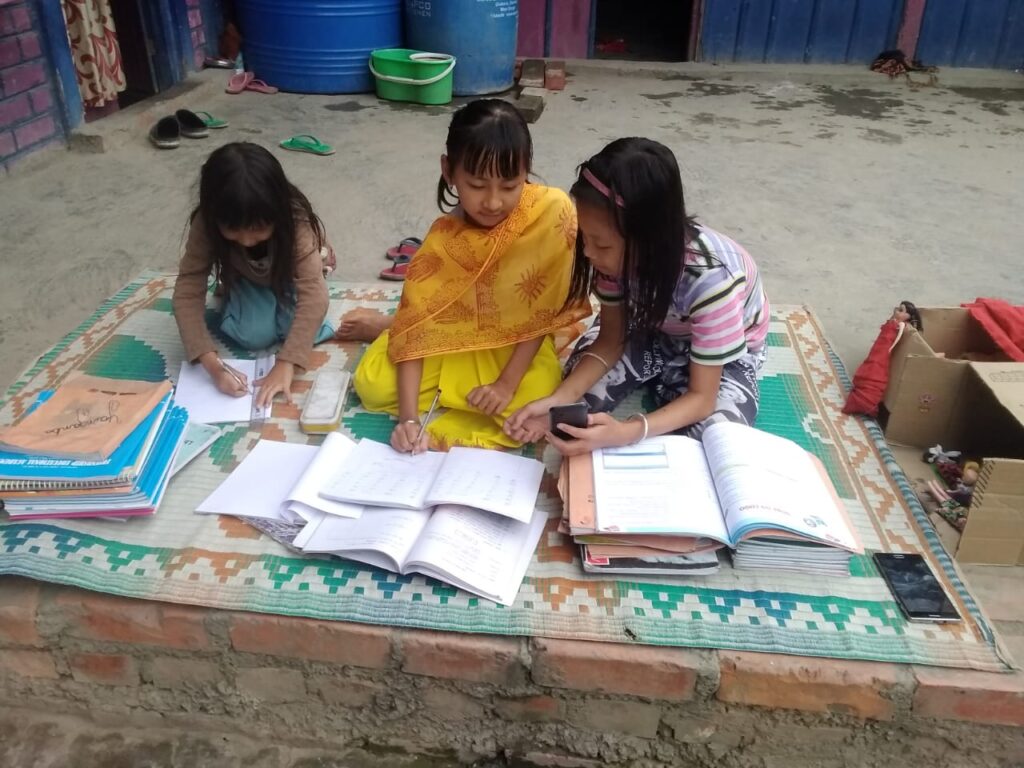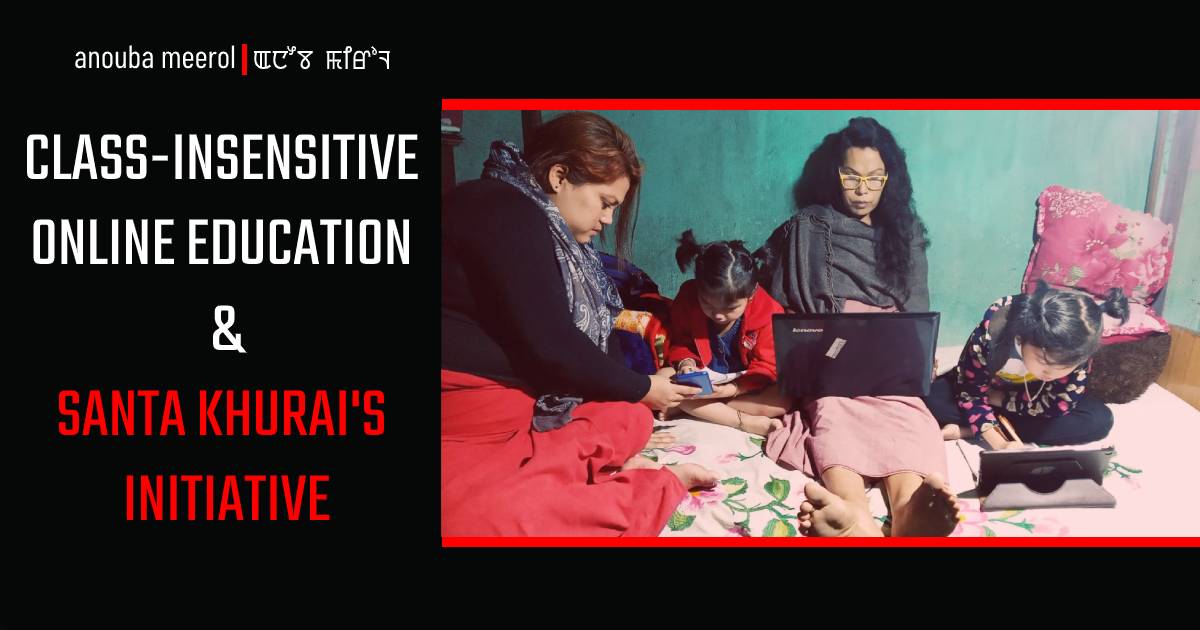The lockdown due to Covid-19 pandemic has created problems for everyone, but the poor are suffering the most. Although many measures have been taken to meet their basic needs, the problems still persist. Some of these measures have given birth to new problems. One example is the introduction of online education, it does not seem to bring any difference for the poor students whose parents cannot afford smartphones. Instead, it has added another burden to the everyday struggles of the parents amid this pandemic. We met two single mothers, Yumnam Thoi and Thangjam Mamita, to understand the challenges they face in the education of their children during the lockdown. We also interviewed Santa Khurai, a Meitei Nupi Maanbi activist, who has started a fundraiser to purchase Samsung Tablets for single parents in her locality who cannot afford smartphones so that their children can access the online materials.
Two Single Mothers with No Smartphone and Online Education
Yumnam Thoi and Thangjam Mamita are single mothers and each of them have three children. They are widows. Yumnam Thoi has two sons studying in the ninth and the tenth standard and a daughter in the fifth standard. Thangjam Mamita has a daughter, a son and an infant. The daughter is in the first standard and the son goes to the kindergarten. With the recent introduction of online education because of the lockdown, the school teachers have been giving assignments to the children everyday for every subject through WhatsApp. However, these mothers cannot afford smartphones and use basic keypad mobile phones.
The mothers have given their neighbours’ phone numbers to the teachers. They borrow the smartphones of their neighbours and note down the home assignments for their children. They say that they are facing a lot of problems and inconveniences as they each have three children and all of them have to do their home assignments. Yumnam Thoi says, “Children are losing interest because the study materials are not readily available as they have to borrow the smartphones from others.” She has to ask her neighbours repeatedly and copy each and every assignment on paper for her children. She feels that with these additional tasks, the whole process has become really complicated.

The mothers tell us that their children are complaining that they have no smartphone and are not able to do their assignments on time because of it.This regular need for smartphones for the home assignments has even led to conflicts with the neighbours. Thangjam Mamita says, “I use eche Santa’s phone to access my children’s assignments, but it is also not possible to come everyday as I have an infant and live across the street.” She has started printing these assignments from a nearby printing shop and these printouts are now piling up like books. Luckily, the printing shop is run by a relative, so she does not have to pay. However, she feels awkward after a point as the shop owner is also running a family. On the other hand, Yumnam Thoi says, “The assignments keep coming in large numbers for my three children, but I am not able to access them on time as I do not have a smartphone.” She is worried because assignments are now piling up and many are yet to be downloaded and copied.
The older children try to manage on their own when it comes to these online assignments by borrowing smartphones from others. But it has really been difficult for the little ones. These problems are not limited just to these two women. There are many single parents with children in the locality and they are also facing similar problems. These mothers feel that if they had their own smartphones, they would not face the troubles of borrowing phones from others and they would be able to make a routine and teach their children. It will also help the children do their assignments efficiently in their own convenient time with more focus.

Issues of a Trans-teen with the Prevailing Education System
Santa Khurai tells us Atey, a trans-teen from a working family, is facing similar issues due to the lockdown. He does not have a device at his house to access the online assignments. Santa Khurai feels if she could provide him a tablet, it would help him get proper education through long distance learning even after the lockdown. She says, “Even before the lockdown, Atey has been facing several problems in school regarding the uniform. The rules entail that Atey should wear the uniform of a girl. Atey has refused to follow the rules because he wants to go to school in a boy’s uniform. Given this conflict, Atey has started losing interest in attending school.” There are few schools which are sensitive to such requirements, but these schools only have classes upto third standard or seventh standard for such children. She says, “Till the family improves financially and the schools become acceptable for such kids, this will be an alternative for kids like Atey to get proper education.” With a tablet, he can be enrolled in a long distance learning program, he could also get more time to help his family and participate in other activities that he loves, Santa Khurai says.
Santa Khurai’s Fundraiser and Alternative Learning
After listening to these concerns, Santa Khurai, a Meitei Nupi Maanbi (an indigenous transwoman from Manipur) has taken up an initiative to crowdfund and provide Samsung tablets to around ten families in her locality. Her initiative focuses on single parents and widows. She says, “During this lockdown, these devices have become a necessity for these families because of the issues they are facing when it comes to the home assignments of their children.” If their husbands were alive, they might have found a means, such as taking a loan. However, for these women to take loans might add up more burden of repaying it, she adds.
Unhappy with the manner in which the online education is functioning, she feels the need to revive the symbiotic relationship between the teachers and children. For that, she suggests conducting sessions on Zoom rooms or similar portals. According to her, the current system lacks interaction, emotional bonding, and is completely mechanical with one way communication. The teachers send assignments over WhatsApp and the students just download, she adds. Santa Khurai says, “In this crucial time, I want the teachers to get involved and re-establish the emotional bond with their students. Instead of just completing the syllabus, I want them to express interest in knowing how their students are living and coping during this lockdown.” Under this initiative for now, she is helping only those children in her locality who go to the same school. She plans to buy Samsung tablets for them with the fund. Later, she plans to approach the teachers for a change in the current online one-way system.

She desires for alternative learning, but she also understands that things take time and need a lot of support. She says, “This initiative is an example and, if successful, I have other things in mind going forward. For this, I am starting this fundraiser to offer them the tablets.” Adding to it, she says that if the technology is not accessible, the mothers and children will not get opportunities and everything will be in vain. Her initiative does not assure to change the system, but it is one initial step, according to her, and she needs the support of the community and government to take it further. She tells us that she is already in contact with organisations which deal with online and alternative learning, and they have committed to help these children free of cost. She says “The initiative is not limited to the distribution of the Samsung tablets to these families. The overall aim is to help these children from poor families in the long run.”
Those who desire to support Santa Khurai’s initiative can make contributions through the link below:
